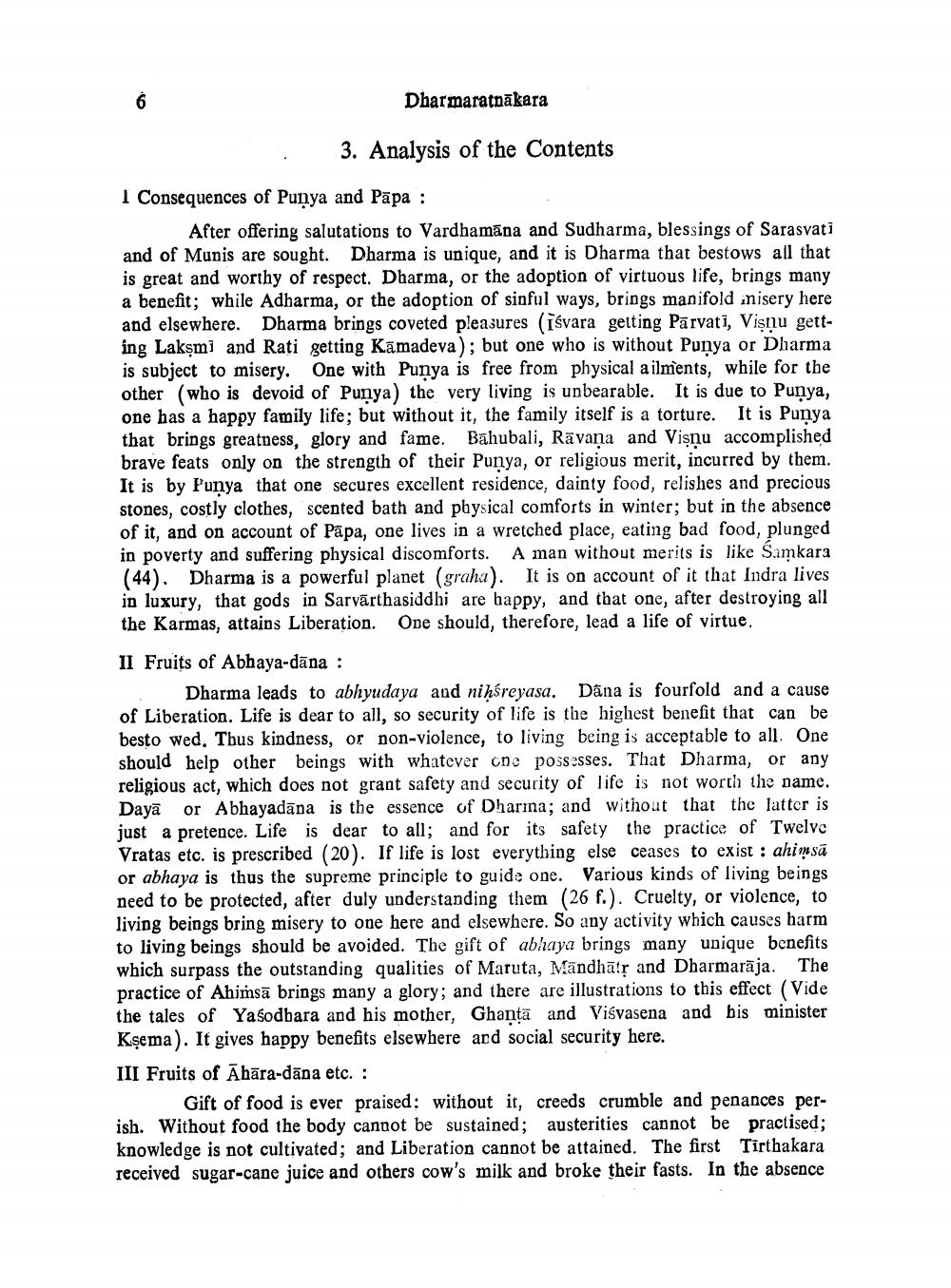________________
Dharmaratnākara
3. Analysis of the Contents
is great and worladharma, or the adoptionleasures (īśvara getti
I Consequences of Punya and Pāpa :
After offering salutations to Vardhamāna and Sudharma, blessings of Sarasvati and of Munis are sought. Dharma is unique, and it is Dharma that bestows all that is great and worthy of respect. Dharma, or the adoption of virtuous life, brings many a benefit; while Adharma, or the adoption of sinful ways, brings manifold inisery here and elsewhere. Dharma brings coveted pleasures (īśvara getting Pārvati, Vişnu getting Lakşmi and Rati getting Kamadeva); but one who is without Punya or Dharma is subject to misery. One with Punya is free from physical ailments, while for the other (who is devoid of Punya) the very living is unbearable. It is due to Punya, one has a happy family life; but without it, the family itself is a torture. It is Punya that brings greatness, glory and fame. Bāhubali, Rāvana and Vişnu accomplished brave feats only on the strength of their Punya, or religious merit, incurred by them. It is by Punya that one secures excellent residence, dainty food, relishes and precious stones, costly clothes, scented bath and physical comforts in winter; but in the absence of it, and on account of Pāpa, one lives in a wretched place, eating bad food, plunged in poverty and suffering physical discomforts. A man without merits is like Samkara (44). Dharma is a powerful planet (graha). It is on account of it that Indra lives in luxury, that gods in Sarvārthasiddhi are happy, and that one, after destroying all the Karmas, attains Liberation. One should, therefore, lead a life of virtue. II Fruits of Abhaya-dāna :
Dharma leads to abhyudaya and nihśreyasa. Däna is fourfold and a cause of Liberation. Life is dear to all, so security of life is the highest benefit that can be besto wed. Thus kindness, or non-violence, to living being is acceptable to all. One should help other beings with whatever che possesses. That Dharma, or any religious act, which does not grant safety and security of life is not worth the name. Dayā or Abhayadāna is the essence of Dharna; and without that the latter is just a pretence. Life is dear to all; and for its safety the practice of Twelve Vratas etc. is prescribed (20). If life is lost everything else ceases to exist : ahimsā or abhaya is thus the supreme principle to guide one. Various kinds of living beings need to be protected, after duly understanding them (26 f.). Cruelty, or violence, to living beings bring misery to one here and elsewhere. So any activity which causes harm to living beings should be avoided. The gift of abhaya brings many unique benefits which surpass the outstanding qualities of Maruta, Māndhātr and Dharmarāja. The practice of Ahimsā brings many a glory; and there are illustrations to this effect (Vide the tales of Yasodbara and his mother, Ghanta and Visvasena and bis minister Kșema). It gives happy benefits elsewhere and social security here. III Fruits of Ahāra-dāna etc.:
Gift of food is ever praised; without it, creeds crumble and penances perish. Without food the body cannot be sustained; austerities cannot be practised; knowledge is not cultivated; and Liberation cannot be attained. The first Tirthakara received sugar-cane juice and others cow's milk and broke their fasts. In the absence




